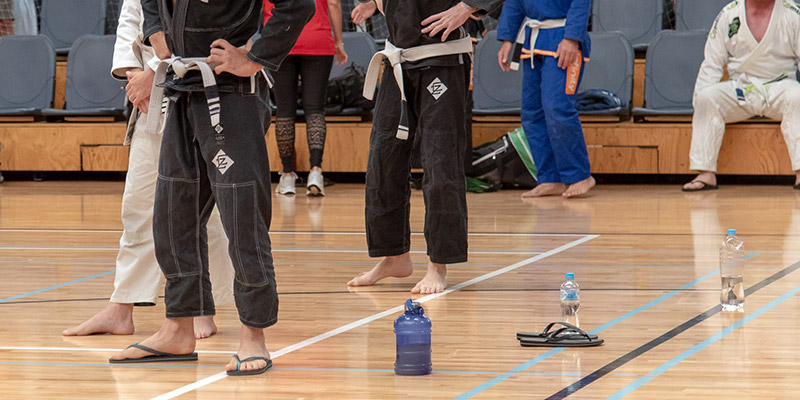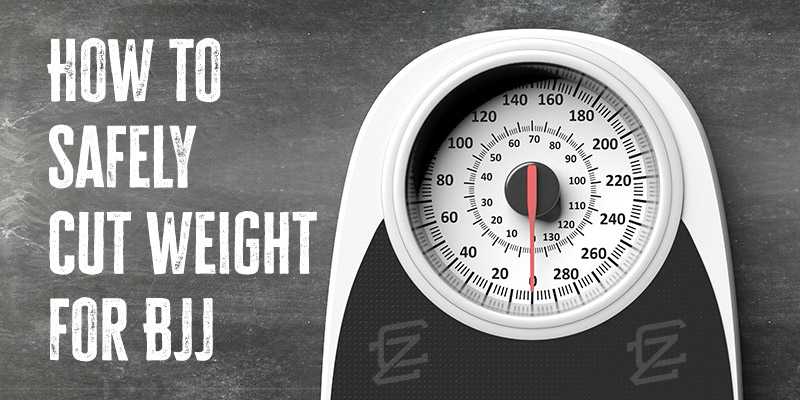How to Safely Cut Weight for a BJJ Tournament

Jyssica Reps CAZA at the 2023 IBJJF European Championship
February 1, 2023
Are BJJ Private Lessons Worth It?
February 18, 2023As with many weight limited sports, some Brazilian Jiu-Jitsu competitors will need to cut weight before their competitions. In this article, we will explain why you should minimise the need to do so, while also giving you a few tips on how to safely shed some weight relatively safely. However, this is not without some risks.
When you sign-up to compete at a BJJ tournament, you need to be at your best physical condition on the day of the competition. Depending upon how many events (gi, no-gi, open weight, etc.) and weight divisions that you register for, any manipulation of your weight so close to a comp day will have an increasing and unavoidable impact on your performance. So, knowing how to cut some weight effectively is important.
For the purposes of this article, we will assume that you are an amateur BJJ competitor who weighs-in on the day that you will be fighting, perhaps only minutes before stepping onto the mats.
Get your weight cutting timing right
If it becomes apparent that you will need to cut some weight leading up to a BJJ tournament, start early. It is recommended that you begin weight-cutting at least two weeks before the event for maximum effect and safety.
There are several considerations for a Brazilian Jiu-Jitsu competitor to take into account, which we will go through now.
Hydration
Dehydration can cause performance issues such as fatigue and impaired concentration, which may lead to injury if not properly managed. It can also lead to heat-related illnesses such as heat exhaustion.
Dehydration makes you weaker. Even mild dehydration will slow down your metabolism, making it harder for your body to burn energy efficiently.

You really need to make sure you are well-hydrated before your matches start. Additionally, you need to maintain your hydration if you are involved in numerous matches throughout the day, especially in a hot venue.
Drinks containing electrolytes are a great choice on the day. Electrolytes have been shown to speed up water absorption, which is hugely beneficial for people with numerous matches or who sweat heavily when rolling. Somewhat confusingly, sodium is an electrolyte (discussed below). But in high amounts it can work against you, as we will see.
Foods to avoid
Some foods and minerals should be closely regulated in the weeks leading up to your BJJ tournament. This will make weight management easier and more stable.
When considering the following points, keep the effect of water retention on weight in mind.
Sodium and foods high in sodium
- Processed foods: Many processed foods contain high amounts of sodium, which can lead to water retention. These include items such as canned soups, sauces, deli meats, and snacks.
- Salty snacks: Foods that are naturally salty, such as potato chips, pretzels, and popcorn, can cause water retention.
- Fast food: Many fast food items are high (sometimes very high) in sodium and will likely lead to water retention.
- Canned vegetables: These are often packed in salty brine to preserve them or purely for flavour, which can contribute to water retention.
- Dairy products: Dairy products such as cheese can also cause water retention due to their sodium content.
- Bread: Some types of bread, especially white bread, contain high levels of sodium and can cause, you guessed it, water retention.
- Condiments: Condiments like soy sauce, tomato sauce (including pasta sauce), and salad dressings tend to be high in sodium and will therefore add to your water retention woes.
It’s important to note that everyone’s body is unique, and some people may be more sensitive to sodium than others. Water retention can be caused by a numerous factors, including hormonal changes, medications and certain medical conditions, so if you’re noticeably experiencing water retention, it’s a good idea to talk with your doctor.
High amounts of carbohydrates
Consuming carbohydrates can cause water retention in the body, although the effect is typically temporary and mild.
Carbohydrates are an important source of energy for the body, and they are stored in the muscles and liver and muscles as glycogen. Each gram of glycogen is stored along with about 3 grams of water. When you consume carbohydrates, your body breaks them down into glucose, which is used for energy or stored as glycogen.
When your body stores more glycogen, it also retains more water. This is especially true if you consume a high carbohydrate foods or if you haven’t been consuming many carbs and suddenly increase your intake. Ask anyone who has been on a Keto diet and fell off the wagon!
It’s worth noting that the amount of water retained due to carbohydrate intake is generally much less than the amount of water retained due to sodium intake, which is the most common cause of water retention. Additionally, the effect of carbohydrate intake on water retention will vary from person to person.
Don’t push it too far
Beware of overly restrictive diets, even in the short-term. Drastic changes in diet can have adverse effects on athletic performance.
A low-carb diet can lead to decreased glycogen availability for the muscles and thus less energy available during your matches. This becomes apparent if you end up having 3 or more BJJ matches in a day, especially if they continue until their respective time limits.
Don’t be tempted by extreme ‘solutions’
If you have chosen an appropriate weight division to compete in, you should never need to even consider any of the following:
- Taking diuretics.
- Taking laxatives.
- Using saunas or other extreme or unnatural sweat inducing protocols.
- Induced vomiting.
These are clearly excessive solutions that shouldn’t be on the table, certainly not for any casual or amateur BJJ competitor. Competing should be fun. If you find yourself pondering these extremes, then it may be time to seriously reconsider your whole approach.
Lose only as much weight as you need to
Try to avoid losing weight unnecessarily. Some people get excited when they see quick weight loss, but this is not always healthy. If you reach your goal weight to safely qualify for your event, go into maintenance mode. This is not the time to drive for further weight loss given the rigorous energy and hydration demand you will soon put your body through. Approach this like an athlete, not an Instagram model.
Bonus: BJJ competition day tips
Weight cutting considerations aside, there are a few other tips that Brazilian Jiu-Jitsu competitors can put to use on competition day.
- If its going to be a close call, don’t drink water until after weigh-in.
- Pass weigh-in early to give yourself time to rehydrate properly.
- Wear a light-weight gi (lower GSM) if you have one, and make sure it is totally dry.
- A slightly desperate idea that might save you enough grams to pass weigh-in is to not hold, or wear, your mouthguard when stepping onto the scales.
You probably don’t want to indulge in some of the more “exotic” ideas at this point as they will only serve as a distraction when you really need to be focused. Shaving all your body hair (and your head), not wearing underwear (actually against IBJJF rules), and, believe it or not – spitting, are not things you should need to resort to after arriving at the venue.
Key takeaways
Be smart about weight cutting in the lead up a Brazilian Jiu-Jitsu tournament. With a bit of planning and self discipline you can avoid needing to cut too much weight or putting yourself in a position where you need to cut too quickly.
Most people routinely spar with larger opponents and won’t be at any real disadvantage by going up a weight division. You don’t get to complain about someone having a few kilos over you in a self defence situation, so why lean on that excuse here? If you have to go up, go up, and be at full strength both mentally and physically.
If it becomes clear that you will struggle to stay inside the BJJ weight division that you signed-up for, change it before its too late. Having to continually assess your weight in the lead up to an event is not worth the additional stress.
Brazilian Jiu-Jitsu coaches don’t tend to be very understanding when one of their team misses weight, even as amateurs. It is totally avoidable, so don’t be that person.


